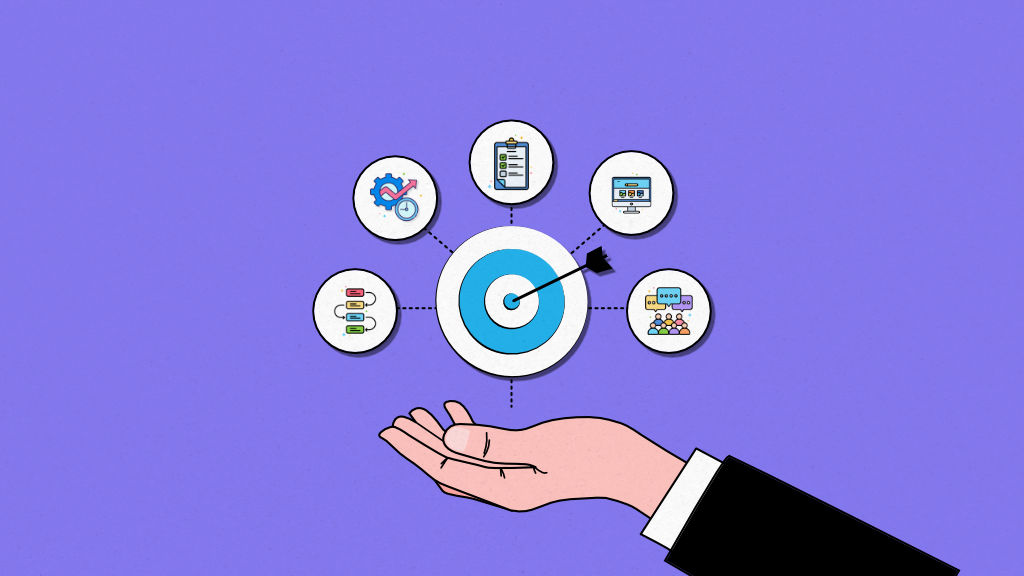Introduction
Work management is a continuous process that enhances team workflows and balances workload distribution. It helps organizations streamline their work and achieve long-term productivity effectively by managing all types of work – whether routine, ad-hoc, or project-based.
From efficient resource allocation to monitoring team performance across various activities, work management provides managers with a comprehensive visibility of diverse functions. Businesses can sustain a competitive edge in the market by maintaining seamless workflow coordination and delivering high-quality outcomes.
This guide on work management offers an in-depth understanding of its nuances and effective practices. We will explore its definition, significance, and challenges. Also, to clear common misconceptions, you will gain insights into the key differences between work and project management. Last but not least, we will also talk about the comprehensive solution that can streamline your work management processes.
What is work management?
Work management is a systematic and comprehensive approach to organizing, executing, and tracking all organizational aspects – such as workflows, processes, resources, time, projects, and tasks – across teams, departments, and organizations. The primary goal is to optimize productivity, streamline workflows, and enhance collaboration to meet organizational objectives.
It helps managers ensure teams work in order to achieve optimal coordination and eliminate unnecessary delays. Also, by getting insights into how teams contribute to and progress towards desired goals, managers can increase clarity, accountability, and transparency across the entire organizational operations, ultimately improving productivity and overall performance.
Importance of work management
Work management helps businesses elevate operational excellence by aligning people, processes, and tools. Here are some key reasons highlighting its significance for businesses:
- Better productivity: Work management eliminates inefficiencies, bottlenecks, confusion, and misunderstandings from the workflows, allowing teams to channel their efforts into strategic and mission-critical activities.
- Improved collaboration: Providing transparency to team roles, task requirements, workloads, deadlines, and shared objectives, work management creates a unified space for the team to improve coordination and work together in alignment.
- Maximum resource utilization: By providing visibility across projects, tasks, and resource utilization, work management offers a structured framework to distribute resources strategically for maximum utilization and impact.
- Improved cost-efficiency: By reducing redundancies, optimizing resource allocation, and streamlining workflows, businesses can cut down on time and effort-wasting factors that inflate costs, including errors, delays, and missed deadlines.
- Data-driven decision-making: Work management provides real-time visibility into workflows, team performance, task progress, and resource utilization, helping managers create strategies based on data, patterns, and actionable insights.
- Increased adaptability: With better control of workflows and several other operations, managers, and teams can quickly respond to make adjustments to changing priorities, unexpected disruptions, and unforeseen challenges.
Steps involved in work management
It is easier to understand work management as a wide-ranging subject that looks deeper at the workflows and processes of the organization.
The six-step process to build a work management framework for your organization is as follows:
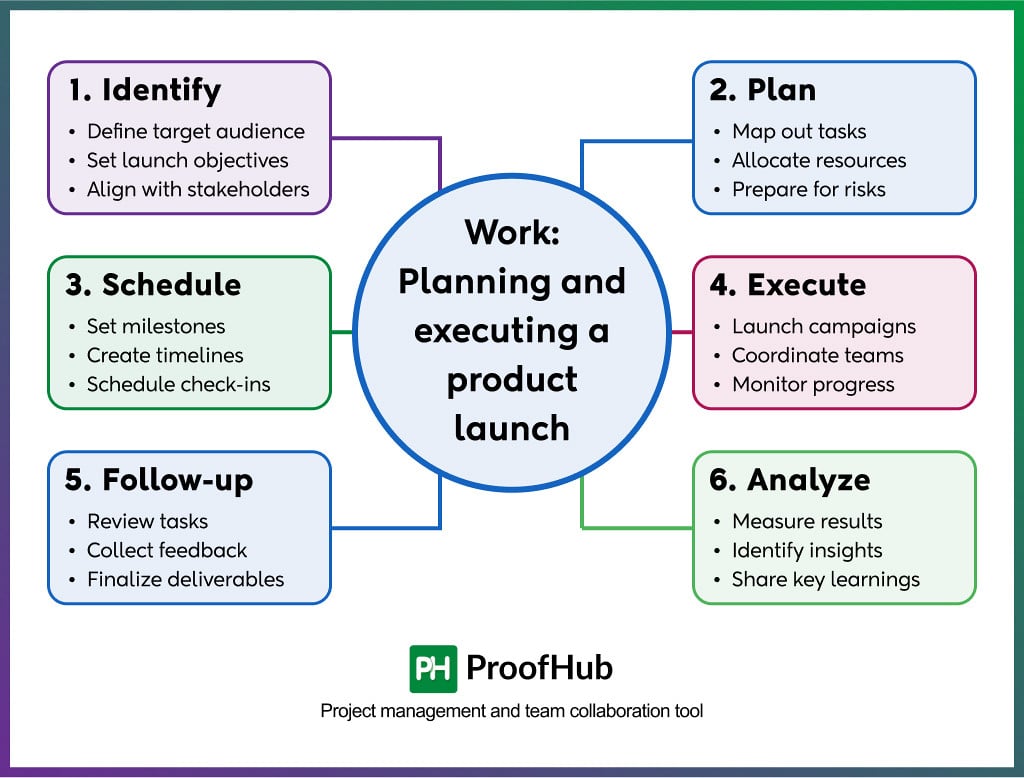
1. Identify
The first step is to dissect your current workflow and identify what you mean by ‘work’. Define the goals you want to accomplish with the work management process. It also entails defining how, when, and who will contribute to achieving these goals
To better understand the workflow and bring shared understanding, you can use a work breakdown structure to break down work into a clear hierarchy of deliverables, projects, tasks, subtasks, dependencies, and initiatives. Make sure to be clear and precise when documenting all this information. Performing this action ensures your teams and their efforts align with desired objectives.
2. Plan
Once you have the entire work scope outlined, the next step is to frame a comprehensive plan. This includes defining task objectives, establishing milestones, assigning team members’ roles and responsibilities, creating risk mitigation strategies, deciding on timelines, and allocating the required resources for task completion.
And that’s just not it. You should also identify recurring tasks and brainstorm potential roadblocks to devise contingency plans. The plan acts as a single source of truth for everyone concerned. During this stage, you should also define the success criteria for better progress evaluation.
3. Schedule
With the work scope identified and the plan outlined, scheduling work It is the next step to manage work. This involves allocating resources and deadlines to every task based on resource availability, task dependencies, and bottlenecks.
A well-constructed timeline helps teams stay organized and meet deadlines. Tools like ProofHub offer built-in Gantt charts and Kanban boards to plot tasks, track progress, visualize workflow, and keep teams in sync.
4. Execute
Now that you have work identified and scheduled, it’s time to get the real work done during this step. Team members start performing their duties as outlined in the schedule while managing priorities and adjusting to changing requirements.
Managers keep a finger on the pulse to ensure teams’ efforts remain aligned and progress stays on track. When encountering any challenges or bottlenecks in the workflow, managers change the course of action to ensure the team meets objectives within the defined timeframe. Also, progress updates are conveyed to team members to keep everyone on the same page.
5. Follow-up
Reviewing progress and monitoring performance are crucial to evaluate if the work is progressing as per the expectations to meet deadlines and goals.
They can make informed decisions by collecting data, insights, and metrics on work performance and outcomes. This analysis creates an opportunity for managers and teams to identify roadblocks, brainstorm possible solutions, provide constructive feedback on employees’ performance, and collaborate to resolve challenges and boost productivity.
6. Analyze
While a partial level of work analysis occurs during the follow-up stage, the post-project analysis offers an opportunity for deeper reflection and meaningful improvements.
Analyzing outcomes and performance against defined objectives provides valuable insights into what went wrong, what performed well, the root causes of delays, and areas that need improvement or elimination. This helps managers continually enhance workflows and refine processes to refine strategies for better outcomes in the future.
Challenges in work management
While work management aims to streamline operations, organizations face various challenges while managing work. These challenges can quickly become roadblocks, eroding your organization’s ability to obtain objectives wisely.
Here are some major examples of work management challenges that organizations face.
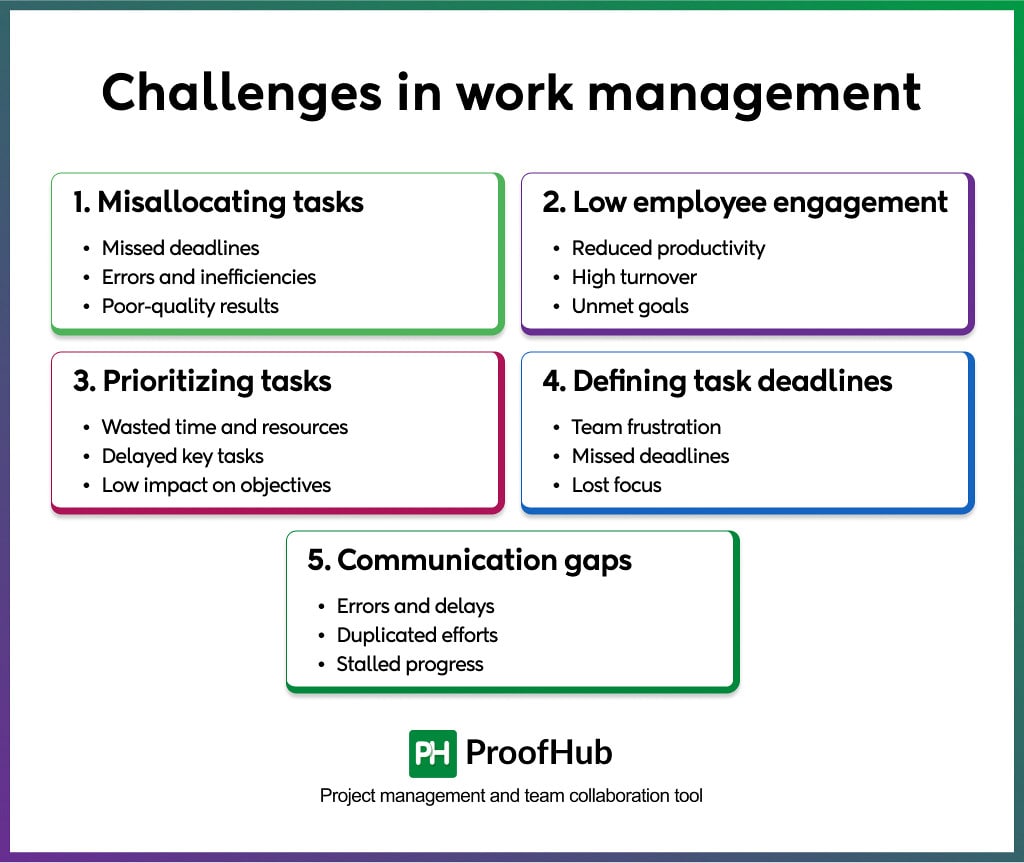
1. Misallocating tasks
Effective resource allocation ensures an efficient delivery system for fewer mistakes. However, assigning tasks without evaluating team members’ skills, capacity, and ability leads to missed deadlines, frequent errors, and extreme inefficiencies in the final product.
2. Low employee engagement
Engaged and motivated employees drive innovation and productivity. However, there are certain barriers such as unclear goals, undefined priorities, and poor communication, that cut them off from their purpose and roles. This lack of engagement stains employees’ productivity, leading to underperformance and high turnover rates.
3. Prioritizing tasks
Drawing a line between urgent and important tasks is necessary to focus on high-impact activities. With poorly defined priorities and goals, teams may tend to focus on non-critical tasks or say yes to whatever comes their way. This results in wasted resources, effort, and time.
4. Defining task deadlines
Setting realistic task deadlines is necessary to establish clear expectations and drive timely actions. However, underestimating timelines or overlooking resource workload can lead to frustration, procrastination, and loss of focus among team members, eventually leading to missed deadlines and diminished productivity.
5. Communication gaps
Effective communication among team members promotes collaboration and synergy, enabling them to accomplish defined objectives effortlessly. A lack of transparent and meaningful conversation can set the stage for miscommunication, errors, duplicated efforts, delays, and even stalled progress.
In an attempt to better manage the work, it’s all about overcoming the challenges to create a system that promotes the overall success of the team.
Work Management vs Project Management
While both work management and project management are often confused with one another, they serve entirely different purposes.
Work management deals with a broader scope, including task management, planning, processes, and resources, not necessarily related to individual projects. The systematic approach provides optimal control over workflows and team dynamics, ensuring everyone gets a shared understanding and alignment to achieve the organization’s overall objectives.
On the other hand, project management focuses on planning, execution, and completion of a specific project within a defined scope, budget, and timeframe. It involves creating to-do lists, establishing dependencies, defining deadlines, and managing resources for seamless project execution.
| Aspect | Work Management | Project Management |
| Definition | Focuses on managing day-to-day operations, tasks, processes, and workflows | Focuses on planning, executing, and completing specific, time-bound projects |
| Scope | Broader | Narrower |
| Focus | Boosting efficiency, productivity, and task coordination | Meeting project-specific goals and milestones |
| Duration | Ongoing and continuous | Has a defined timeframe within defined constraints |
| Objective | Streamline workflows, optimize productivity, and achieve long-term goals | Deliver a product successfully |
| Participants | Shared across teams and departments | Led by a project manager with a defined project team |
| Use Cases | Managing daily operations, team communication, and task tracking. | Building a new product, launching a campaign, or implementing a system |
So, it is reasonable to state that project management is a subset of work management.
How can ProofHub help in work management?
ProofHub is a robust project management and team collaboration software designed to streamline your work management processes. From creating customized workflows to optimizing resource workloads, ProofHub promotes collaboration and drives efficiency at all levels.
It centralizes projects, teams, resources, knowledge, and processes in one place so that you don’t have to hustle across multiple apps to provide the best results possible. By boosting productivity, enabling data-driven decisions, and enhancing cost-efficiency, ProofHub helps organizations achieve optimal success seamlessly.
1. An all-in-one software solution
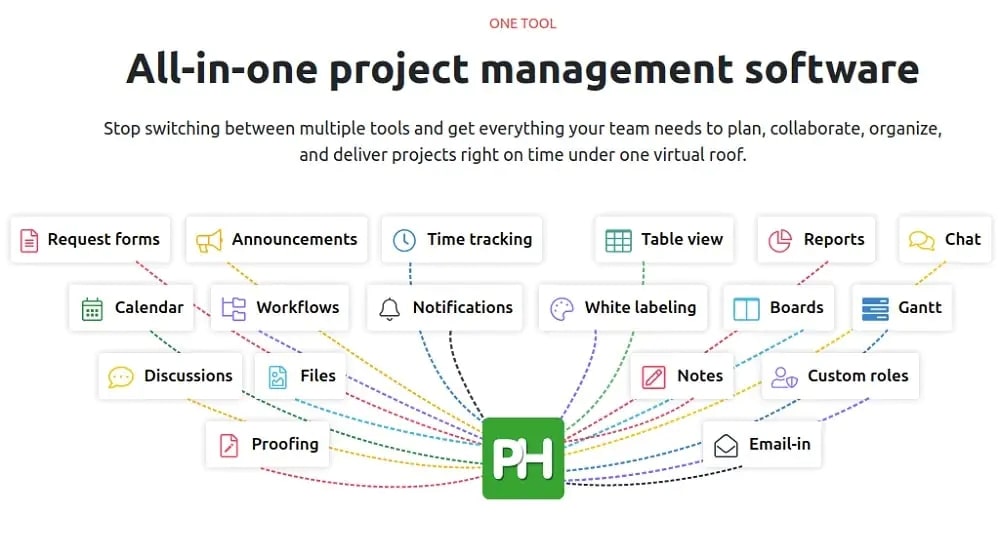
ProofHub provides a comprehensive feature set to manage work across your entire organization, including task scheduling, time tracking, file management, performance evaluations, and project reviews. It streamlines the entire organization’s operations without relying on multiple apps.
Its flexible features can be tailored to suit several business requirements and work styles. Teams can manage tasks, track time, and analyze performance to align their efforts and make cohesive contributions toward overall objectives. This unified platform makes it easy to oversee and manage complex workflows from one place.
2. Simplifies work management
From planning projects and creating tasks to delegating responsibilities and managing deadlines, ProofHub makes it easier for teams to manage all the work seamlessly.
It empowers teams whether working on personal task lists or along with the whole team, to stay on their tab without the need of switching between tools and multiple browser windows. Also, its cloud-based interface ensures your information remains secure and accessible- regardless of the location and time zone.
3. Enhances team collaboration
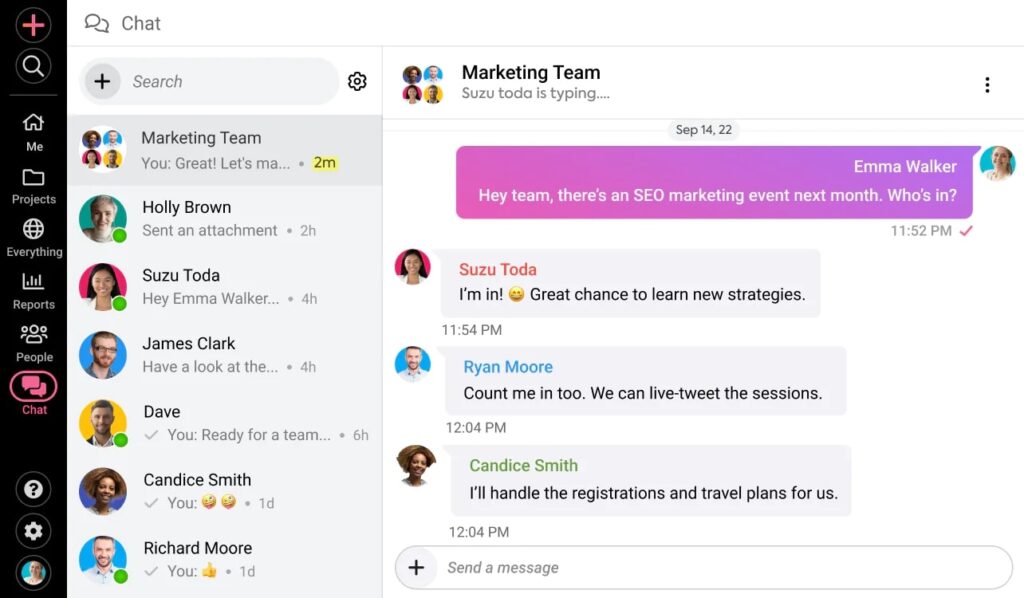
Collaboration is the fundamental aspect that contributes to both individual and team success. With 73% of employees reporting improvement in performance due to collaborative work, its significance cannot be overstated. ProofHub streamlines teamwork by providing a decluttered interface to help teams communicate in real-time, add comments, have discussions, provide updates and feedback, share files, and proof documents. This helps you cut down on inefficiencies, misunderstandings, and miscommunication that arise due to unnecessary meetings and back-and-forth email chains.
4. Promotes fair workload distribution
Delegating work amongst teams may seem a simple approach to managing tasks. That said, a lot of thinking must go into performing this task. To be fair and effective, you must delegate work by taking their skills, expertise, and availability into account.
ProofHub’s intuitive reports help you track how much is available on each individual’s plate. It allows you to get a clear look at who is working on what and when, along with their workload. This means, that if you see someone being over-occupied or underutilized, you can reschedule work to ensure employees stay balanced and productive.
5. Enhances workplace visibility
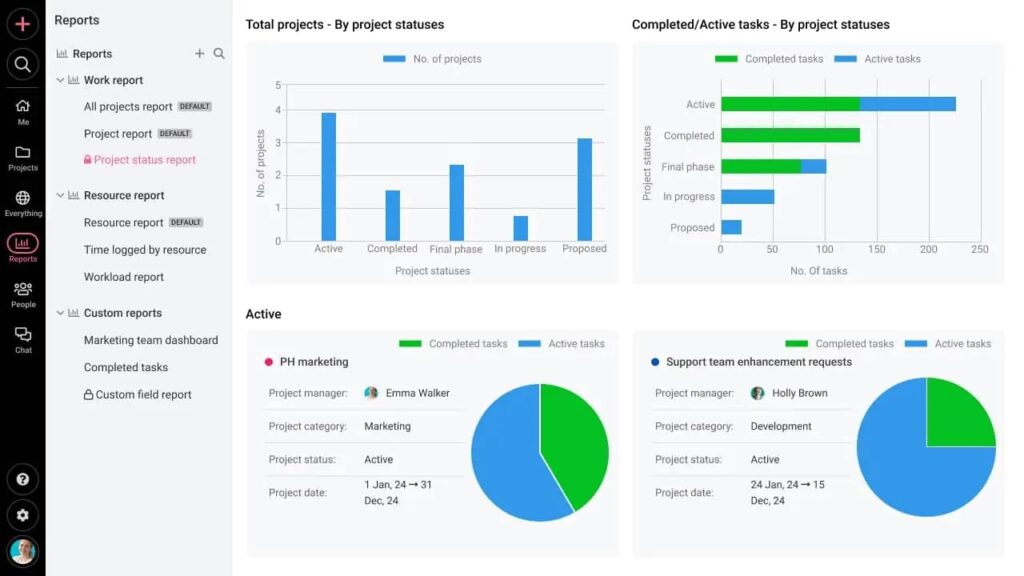
Staying on top of the project’s progress is crucial to evaluating how it is performing against the set objectives. And that’s where ProofHub’s robust reporting tools come in handy. These provide up-to-date insights across various metrics.
Be it project status, workload, or time utilization, ProofHub’s one-click comprehensive reporting ensures you stay informed and proactive. You can share these insights with teams or stakeholders to discuss progress, create and refine strategies, or merely keep them in the loop. Also, when you spot issues early on, you can quickly intervene to avoid delays and get everything sorted before it becomes too critical to resolve.
6. Centralizes information
With all the necessary information in one place, teams can make concentrated efforts without wasting their time locating information that’s scattered and distributed across platforms. ProofHub simplifies this by keeping a record of everything in one system.
It creates a centralized hub for your team to store and share files, documents, discussions, and communication, in one place. By providing necessary control over the entire organization’s assets and knowledge, you and your team can get work done without disruptions.
7. Prioritize essentials
There is a fine distinction between urgent and important tasks. Not every urgent task is necessarily important, and vice versa. It requires a clear understanding of priorities.
ProofHub helps you define priorities and keep tasks organized effectively. By clearly outlining objectives and deadlines, you can enable your team to work on tasks with greater significance to business goals. This minimizes confusion and ensures impactful results.
8. Promotes flexibility
ProofHub’s user-friendly interface is designed to support multiple time zones and languages. And that’s the reason organizations with teams scattered all across the world find ProofHub to be an ideal solution.
By offering customizable workflows, task views, and roles to fit different work styles, managers can keep everything moving and stay connected even from afar. This flexibility ensures teams continue to perform effectively by adapting to evolving needs.
9. Scalable and cost-effective
ProofHub helps organizations control their budgets by eliminating the need for siloed tools and curbing the costs associated with them. It has everything required for users to gain control over workflows, costs, and outcomes.
Additionally, ProofHub’s flat-fee pricing and no-per-user structure allow teams to add unlimited users to the interface without additional costs. This scalability makes it an effective and affordable solution for teams of all sizes, especially those with growing needs and increasing workloads.
Conclusion
Work management plays a critical role in helping organizations maximize their efforts to achieve their vision and goals. It facilitates shared understanding among teams, empowering them to work cohesively towards shared objectives.
By improving productivity, fostering a culture of collaboration, and leveraging work management tools like ProofHub, you can streamline workflows and enhance team efficiency. This ensures our team stays focused on what truly matters, delivering impactful results effortlessly.
FAQs
What role does leadership play in effective work management?
Leadership plays a crucial role in fostering a culture of accountability and providing the necessary support and resources for successful work management implementation.
How does work management help in achieving long-term goals?
By providing a structured approach to clearly defining goals, eliminating roadblocks, identifying inefficiencies, optimizing workflows, and bringing alignment across teams, work management helps teams achieve long-term goals effectively.
What tools can help with work management?
Although countless work management solution options are available in the market, ProofHub stands out as an effective and comprehensive work management software. It is designed to build workflows and streamline processes of all sizes and complexity levels.
How does work management improve productivity?
Leadership plays a crucial role in fostering a culture of accountability and providing the necessary support and resources for successful work management implementation.
